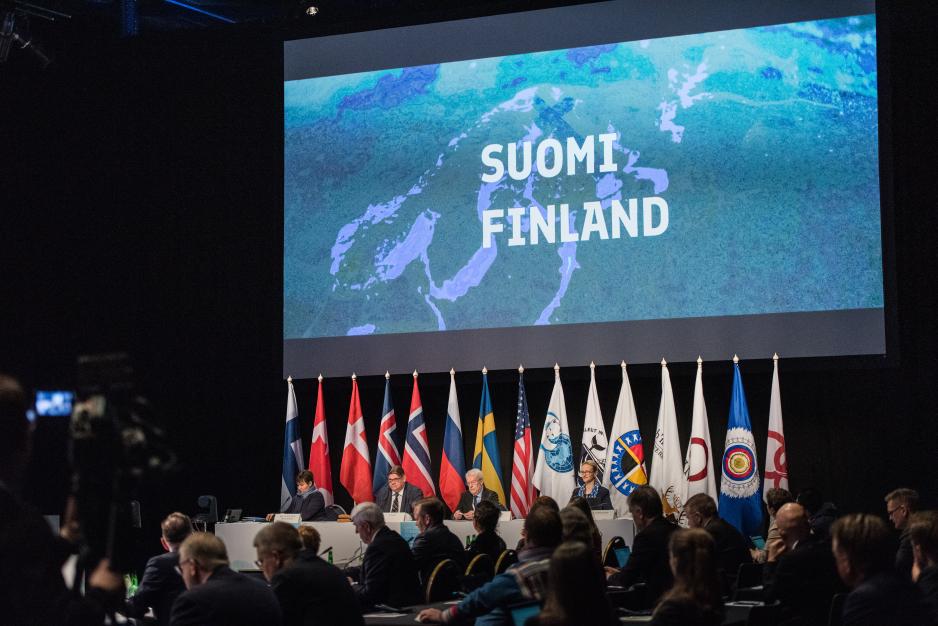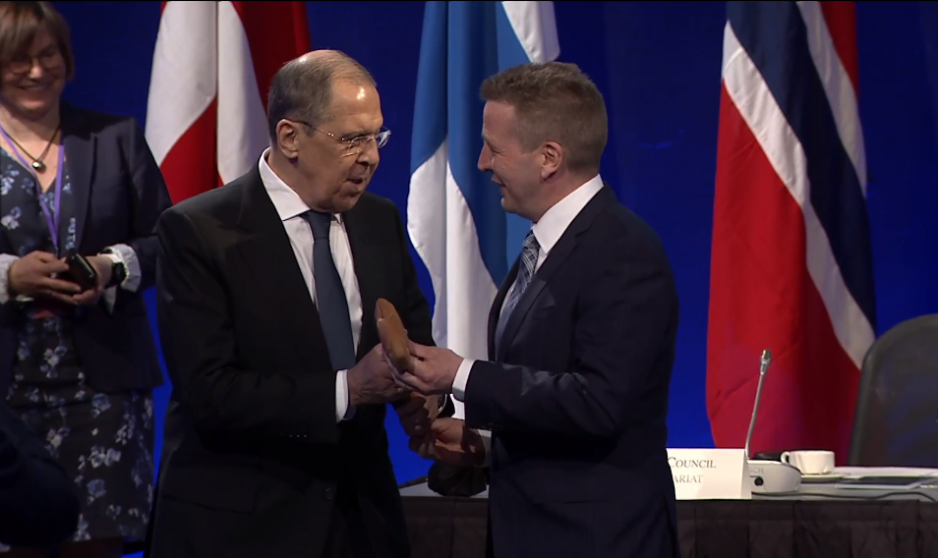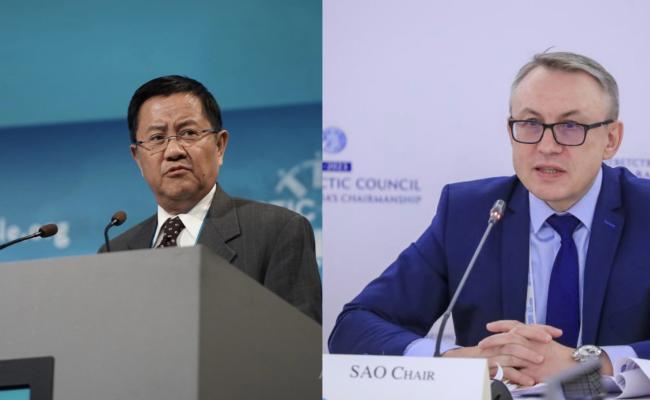Fulfilling the Promise of the Arctic Council: "The Need for Cooperation is Stronger Than Ever"

The 11th Arctic Council Ministerial Meeting on 7 May 2019 hosted by Finland in Rovaniemi. (Source: Jouni Porsanger / Ministry for Foreign Affairs of Finland)
"The Arctic, and our future, has become the subject of increased attention during the past decade, including by non Arctic states and organizations. Almost everyone now has an Arctic strategy, or policy. Except for a Pan Arctic policy statement coming from the people who actually live here in the Arctic", writes Paul Fuhs, Northern Forum Goodwill Ambassador.
The closest thing to a Pan Arctic sustainable development policy is contained in the Ottawa Declaration, forming the Arctic Council, signed by the 8 Arctic nations in 1996. The Declaration is sound, but key elements of the Declaration have never been implemented.
The concept of the declaration is that the Arctic is a ‘special’ place, requiring the cooperation of Arctic states and people, including a “commitment to the well being of the inhabitants of the Arctic.”
The Council was established as a high level forum to:
“Provide a means for promoting cooperation, coordination and interaction among the Arctic States, with the involvement of the Arctic indigenous communities and other Arctic inhabitants on common arctic issues, in particular, issues of sustainable development and environmental protection in the Arctic.”
Issues of military and national security were strictly excluded.
The Arctic Council has been militarized with a complete blockade against our cooperative work
Well received
This declaration was well received by the people of the Arctic and we viewed it as a solemn promise that these Arctic nation states made to each other, and more importantly, to the people of the Arctic, who well understand the value of Arctic cooperation.
It was a recognition that the Arctic was so special that it warranted a whole separate, cooperative pan Arctic Council, in addition to the traditional diplomatic relations these nation states have with each other.
Over the 25 years of cooperation in the Arctic Council, many accomplishments were made, including the sharing of Best Available Technology and Best Management practices for resource development, fisheries research and management, marine safety and emergency response, educational exchanges of all types, joint research and action on climate change, diplomatic and visa services, etc.
All to the benefit of the inhabitants of the Arctic.
A zone of peace
This Arctic cooperative work was never considered to be strategic from a military or national security point of view, and the Arctic was considered a ‘zone of peace’. Nevertheless, despite our faithful exclusion of military issues in our work, the Arctic Council has been militarized with a complete blockade against our cooperative work.
Also read (the article continues)
However, this blockade seems to be almost entirely symbolic, because by any sober assessment, this obstruction will have no impact whatsoever on the geopolitical dispute in Ukraine. What actually is lost is the focus on benefits to the inhabitants of the Arctic, regardless of where we live.
Our issues remain the same and the need for cooperation, given the impact of climate change, is stronger than ever.
Honoring the pledge
Refocusing on these issues in a pan Arctic manner, will be one of the most important contributions that the Arctic Council can make to a post conflict world. There are already discussions in Norway, the current chair of the Council, to restart some of the pan Arctic work that can be done without extensive travel.
At a bare minimum, the immediate restart of pan Arctic cooperation should be included in any negotiated settlement of the Ukraine situation. That would he honoring the pledge that all Arctic nations made to each other and to the people of the Arctic in the formation of the Arctic Council
FULFILLING THE WORK PLAN OF THE OTTAWA DECLARATION:
Beyond the commitment to cooperation in general, the declaration laid out some specific work plans that have yet to be accomplished. One of the most important is the commitment to:
(c) “adopt terms of reference for, and oversee and coordinate a sustainable development program.”
The declaration also affirmed a commitment to “protection of the Arctic environment including… sustainable use of natural resources.”
SAOC Morten Høglund were celebrated at the Arctic Circle Assembly in Reykjavik for his effort to keep the Arctic Council alive. (Photo: Trine Jonassen)
Never fulfilled
This commitment has never been fulfilled, although it might be the most important, both as a statement of what ‘sustainable development’ means to the people of the Arctic, but also some specific actions necessary to implement them.
Since he national governments seem to be having so much trouble working together on Arctic issues, a realistic sustainable development program can best be initiated by the sub national organizations around the Council, including The Northern Forum (association of Arctic regional governments and states), The Arctic Mayor’s Forum, The Arctic Economic Council, the Barents Euro-Arctic Council, and the associated indigenous organizations across the Arctic.
Overall structure of the Arctic:
The demographic and physical structure of the Arctic includes a generally low and dispersed population base, surpluses of oil, gas, minerals, fiber, protein – fish and agricultural products, that can reliably and efficiently be exported to meet the needs of the heavily populated industrial Northern Hemisphere.
In addition, the Arctic provides unmatched tourism experiences for people from the overpopulated and environmentally degraded South. The Arctic is also characterized by a strong indigenous presence and heavy reliance on subsistence food security and culture. Therefore, high environmental standards for development are required.
Air and marine transportation are critical to life in the Arctic, with the vast majority of imports and exports carried by maritime operations.
Response to ‘climate change’ is currently a driving force of Arctic policy
Energy
Since response to ‘climate change’ is currently a driving force of Arctic policy, energy related issues are of particular importance. Along with basic human relations, energy has been the central organizing principle of civilization ever since humans learned to control fire. In the modern era, it has become indispensable.
Arctic communities are dependent on it, yet we realize the impact of global climate change. How global energy policy is managed will have a critical impact on the future of the Arctic. An energy transition must be both practical and economic and must not further harm our Arctic communities.
Therefore, we declare these basic principles of an Arctic Sustainable Energy Policy:
- We recognize the impact of global climate change on the Arctic due to the consumption of fossil fuels by the 7 billion people of the non-arctic nations.
- We support the implementation of energy efficiencies to reduce consumption, the use of alternative fuels locally and globally and we recognize that traditional fuels will be necessary during a long transition period.
- We recognize the important contribution of the production of traditional fuels to Arctic economies, both in the private and public sector. Public revenues from production of traditional fuels have also often been used to finance renewable energy in the Arctic, which leads the world in alternative energy production.
- We support the production of hydrogen based alternative fuels using stranded energy in the Arctic, both for local consumption and for export.
- We support the development of environmentally responsible mining operations in the Arctic to produce the metals necessary for a transition to alternative fuels.
- We object to the selective discrimination against Arctic traditional fuels and mining operations by NGO’s, governments and private sector banking and insurance companies.
- We support enhanced cooperation and prevention measures for shipment of fuels and cargo on the Northern Sea Route.
- We strongly support the ability of Arctic people to peacefully share best practices and technologies in energy and resource development/protection, without restrictions.
Dramatic impacts
The Arctic regions are experiencing the most dramatic impacts of a warming world. Our indigenous people have been adapting to a warming planet for the past 10,000 years, at a time when ocean levels were 100 meters (330 feet) below their current levels. However, in the modern era, this warming has been accelerated by the consumption of fossil fuels.
Also read (the article continues)
The fact is, that halting all Arctic oil and gas development, as suggested by the European Union and various ‘environmental’ groups, won’t result in even one drop less oil being burned. The Arctic produces about 10% of the world’s petroleum resources, so an energy hungry world will just get its energy resources from somewhere else, often under lower environmental standards.
Current proven world oil reserves indicate 53 years of supply.
Renewable energy
The Arctic leads the way toward renewable energy: Iceland 100%, Greenland 81%, Alaska 30%, Canada 16%, Russia 21%, Denmark 32%, Norway 98%, Sweden 55%, Finland 25%. By comparison, the US is only 9% renewable, the OECD nations 10.5% and the non-Arctic EU 13.4%.
The campaign to blame the Arctic for climate change is particularly unwarranted. The World Wildlife Federation issued a report claiming, “Arctic nations produce 22% of CO2 Emissions”. The only way they can claim this is by including the CO2 emissions of the ENTIRE United States at 13.4%. In fact, Alaska, the Arctic part of the US, is only 0.006% of that number.
A similar false calculation was used for Canada and Russia.
Edward Alexander is co-chairman of the US Gwich'in Council International (GCI), which is a permanent participant in the Arctic Council. His organization has kept going as well, not knowing what will be the outcome of their work. (Photo: Trine Jonassen)
False narratives
We also witnessed the false presentation of a dying polar bear by National Geographic under the title “This is what climate change looks like” even though no other polar bears in the area were in such condition. They eventually had to admit to this deception, but only after there had been 2.4 billion viewings of the image.
These false narratives and counterproductive policies around energy provide only harm for both Arctic residents and the consumers of the industrialized southern countries.
Mining:
Mining is an important industry for Arctic economies and will also play a critical role in providing the necessary base and rare earth metals for batteries and drive motors for a non-carbon transition. For instance, an electric car requires 85 kg (193 pounds) of copper per vehicle. At a 3% recovery rate, three tons of copper ore must be mined for each electric vehicle.
The Arctic can supply many of these critical mineral resources. Despite the need for these minerals, and the importance of mining projects to economies of the Arctic, we have seen the same patterns of lawsuits, protests, and discrimination by banks and insurance companies.
Transportation:
Reciprocal port access and air landing agreements and diplomatic and visa services are critical to a well-functioning Arctic transportation system. Use of the Northern Sea Route can reduce CO2 emissions by using a shorter route and can also provide efficient access to European and Asian markets for Arctic goods.
The safety of this route can be enhanced by cooperative vessel tracking, monitoring and emergency response services.
As ocean waters warm, fish stocks are moving further north.
Subsistence:
Many Arctic cultures rely on local hunting, fishing, and gathering to provide for food security and to continue centuries old cultural traditions. We also recognize that modern subsistence tools and methods require a cash economy. Industrial developments in the Arctic should be conducted in a manner to not harm these activities.
Long term Indigenous and local knowledge should be respected and utilized in understanding a changing Arctic. We celebrate the continuation of indigenous cultural traditions and languages.
Fisheries:
As ocean waters warm, fish stocks are moving further north. Cooperative research and cooperative fisheries management agreements that have been disrupted will be necessary. In the Western Arctic, the Joint Norwegian-Russian Fisheries Commission continues its work for research and setting quotas and is a model for continued necessary cooperation.
Tourism:
Arctic tourism can provide economic benefits, but operators must be respectful of local cultures and provide real local benefits in their operations. Restrictions on visas and reciprocal flight operations must be lifted to allow travel for tourism.
Forestry Operations:
The Arctic zones can provide wood materials for construction and fiber for paper and other applications. Timber operations should meet the requirements of the Sustainable Forestry Protocol. As proposed at the recent COP26 deliberations in Glasgow, Arctic forests can provide a major carbon sink.
Also read (the article continues)
Overall Environmental Protection:
An additional work plan commitment of the Ottawa Declaration is to “oversee and coordinate the programs established under the Arctic Environmental Protection Strategy on the Arctic Monitoring and Assessment Program (AMAP)Conservation of Arctic Flora and Fauna (CAFF), Protection of the Arctic Marine Environment (PAME), and Emergency Prevention, Prepared ness and Response (EPPR).”
All of these working groups, none of which have any connection to military or national security issues, should be immediately restarted with all pan Arctic members of the Arctic Council. The Arctic issues that justified the formation of these working groups, all remain and must be addressed. The Arctic Coast Guard Forum should also be immediately reconstituted.
The agreement on the formation of the working group Cooperation on Marine Oil Pollution, Preparation and Response states that the Arctic nations are “Aware of the Parties’ obligation to protect the Arctic marine environment and mindful of the importance of precautionary measures to avoid oil pollution in the first instance.”
Recent technological advances include the ability to track and monitor vessel movements, to transmit navigation safety information directly to vessels, to direct rescue operations and to provide real time analysis of ice conditions and local weather.
These should be applied across the Arctic to enhance prevention measures, regardless of other unassociated geopolitical issues.

Russian Foreign Minister Sergey Lavrov receives the gavel from Icelands Foreign Minister, Gudlaugur Thór Thórdarson during the Arctic Council Ministerial meeting at the Harpa Concert Hall in Reykjavik, Iceland May 20, 2021. (Photo: Arctic Council)
Telecommunications:
Arctic based corporations in the Arctic, particularly in Finland, led the world in developing mobile phone, server, and router developments. A trans Arctic fiber optic cable is currently being considered which can provide local service and will also be a critical redundancy to the world fiber optic system.
This system and others such as satellite based Starlink, can provide high speed broadband access which is critical to Arctic communities for commerce, education, international cooperation, and health services. The goal should be to provide these services at costs similar to the industrialized South.
Arctic Investment and Finance:
International banks and insurers have announced a policy of deliberate discrimination against Arctic oil and gas projects, simply because the projects are in the Arctic. This is the same historical racist ‘redlining’ practice used by banks in areas where certain people were considered to be substandard and this discrimination should be challenged through bank regulators.
If this discrimination continues, we should consider forming an Arctic Development Bank with private and governmental financing agencies, that will evaluate projects based on their economic merits in conformance with the Arctic Investment Protocol adopted by the Arctic Economic Council.
Education:
An additional Ottawa Declaration commitment is to: (d) disseminate information, encourage education and promote interest in Arctic-related issues.”
Preparing Arctic youth for their future is a critical function of sustainable development. Our young people must understand the realities of our economy and our environment and the related tradeoffs of risks and benefits of resource development and environmental policy. Preparedness for skilled labor and professions is essential and all jobs deserve equal respect.
We pledge to develop an Arctic sustainable development curriculum for secondary schools, which can be taught across the Arctic. We will also support student exchanges in education, culture, and sports.
The use of these sanctions has failed to provide tangible results
Diplomatic Relations:
The use of broad-based sanctions and visa restrictions has been very harmful to the people of the Arctic and have restricted our ability to share best available technologies for environmental protection. The use of these sanctions has failed to provide tangible results and indicates a failure of diplomacy.
The Arctic should continue to be viewed as an area of cooperation and peace, separate from other worldwide international conflicts.
We recognize the importance of international cooperative councils such as the Arctic Economic Council, Barents Euro-Arctic Council, the Northern Forum and the Arctic Mayor’s Forum which include the direct participation of local and regional governments along with indigenous organizations, in conjunction with national governments.
While Arctic cooperation in these groups is now restricted by other non-Arctic events, these cooperative efforts should be allowed to immediately resume their activities once these other conflicts are resolved.
A Peaceful and Productive Arctic:
While we understand and respect our nation’s efforts to maintain national security in the region, we continue to support the Arctic being treated as a peaceful zone of the world where we can cooperate with each other for a productive future for ourselves and future generations.





